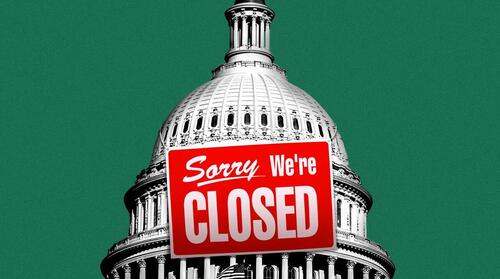When Could The Government Shutdown End And What Might Finally Force Breakthrough?
Authored by Tom Ozimek via The Epoch Times,
With the federal government shutdown now in its third week and officially one of the longest in modern U.S. history, Congress remains at an impasse with no negotiations underway to end it.
In the absence of talks, the clock is now ticking towards a string of critical dates and pressure points that could test lawmakers’ resolve and potentially break the stalemate.
Since the shutdown started at midnight on Oct. 1, multiple attempts to fund and reopen the government have failed in the Senate. Earlier this week, the Senate for a tenth time rejected a Republican-backed bill that would temporarily extend government funding.
Democratic lawmakers maintain that reopening the government must go hand in hand with extending the health care subsidies that are due to expire at the end of the year. Republicans counter that the two issues should be handled independently and say subsidy negotiations can only begin once the shutdown is over.
Senate Majority Leader John Thune (R-S.D.) said on Oct. 17 that Republicans are willing to sit down with Democrats to discuss their health care demands—but only after the stoppage ends and the government is back open.
“I’m even willing to give them a vote. Today. Tomorrow. Next week. You name it,” Thune said in a post on X.
“But there’s one condition: End the Schumer Shutdown. I will not negotiate under hostage conditions, nor will I pay a ransom. Period.” He was referring to Senate Minority Leader Chuck Schumer (D-N.Y.).
As the shutdown drags deeper into October, the calendar now becomes a significant factor in the drama.
Key Dates That Could Shift the Stalemate
On Oct. 24, more than two million federal workers will miss their first full paycheck.
While a 2019 law technically guarantees back pay, missing income will add financial strain on families, particularly in regions with large federal workforces.
Air traffic controllers—more than 10,000 of whom are currently working without pay—remain one of the most closely watched groups. During the 2019 shutdown, a wave of unscheduled absences among controllers forced cascading flight delays and helped bring that standoff to an end.
A second flashpoint is Oct. 31, when over a million active-duty service members face uncertainty over their next paycheck.
The administration used roughly $8 billion in leftover Pentagon research funds to cover military pay on Oct. 15, but some lawmakers say that funding maneuver cannot be repeated.
“I do want you to know that that option is not going to be available in two weeks for their next paycheck,” House Armed Services Committee Chairman Mike Rogers (R-Ala.) told reporters on Oct. 17.
“We have 2 million service members that were able to get paid this week because of President [Donald] Trump’s creativity. These are families that are serving around the world. Many of them in very unfavorable conditions, making huge sacrifices for our freedom and safety, and most of them live paycheck-to-paycheck.”
Rogers noted that about 500,000 civilian federal employees will miss their first full paycheck next week, “and then the rest of them the week thereafter.”
“This is going to get really painful for a lot of civilian employees. Obviously, I think about the [Department of Defense] civilian employees. But throughout the federal workforce, people will start missing their first paycheck next week and the week after,” Rodgers said.
According to media reports, Thune has proposed a bill to pay U.S. troops and “excepted” employees—those still required to work during the shutdown—but it would not cover furloughed workers and is unlikely to advance without Democratic support.
Another politically fraught deadline arrives on Nov. 1, the start of the Affordable Care Act open enrollment.
Democrats have drawn a red line here, saying that millions of Americans will soon be selecting coverage without knowing if they can afford their premiums in 2026.
Republicans have countered that subsidies do not expire until the year’s end and that negotiations should resume only after the government reopens, while Democrats said public pressure will soar if they allow enrollment to proceed amid uncertainty.
“If we don’t deal with this before Nov. 1, it becomes trickier to solve legislatively, but the heat gets turned way up by the public to do something,” Sen. Chris Murphy (D-Conn.) told Punchbowl News last week.
Looking even further ahead, Thanksgiving week could be another significant pressure point.
Unpaid TSA officers and air traffic controllers—already strained by weeks without income—would be working through one of the busiest travel periods of the year.
In 2019, aviation disruption during a similar shutdown helped tip the balance toward reopening the government.
Tyler Durden
Sun, 10/19/2025 – 11:40ZeroHedge NewsRead More





 R1
R1
 T1
T1


